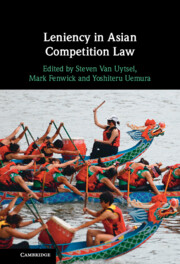Book contents
- Leniency in Asian Competition Law
- Leniency in Asian Competition Law
- Copyright page
- Contents
- Tables and Boxes
- Contributors
- Preface and Acknowledgements
- Abbreviations
- Part I Introduction
- Part II Leniency in Historical, International and Theoretical Context
- Part III Leniency Programmes in Selected Asian Jurisdictions
- 5 The Original Leniency Programme of Japan
- 6 Negotiated Leniency in Japan Embedded in Ever-Increasing Sanctions
- 7 The Law and Policy on Cartels and Leniency in Korea
- 8 The Leniency Programme in Taiwan
- 9 The State Administration for Market Regulation and Its Leniency Programme
- 10 Leniency Policy in Singapore
- 11 The Leniency Programme in Malaysia’s Competition Regime
- 12 Hong Kong’s Revised Leniency Policy and Its Potential to Deter Cartels
- 13 The Leniency Programme under the Indian Competition Law
- 14 Cartel Defection in the Philippines through Leniency
- 15 The Absence of a Leniency Programme in Thai Competition Law
- Part IV Concluding Remarks
- Appendix Schematic Overview of the Leniency Programmes from Korea, Japan, Singapore, China, India, Taiwan, Malaysia, Hong Kong and the Philippines
- Bibliography
- Index
5 - The Original Leniency Programme of Japan
Law Making in the Shadow of Lobbying, Political Pressure and Legal Constraints
from Part III - Leniency Programmes in Selected Asian Jurisdictions
Published online by Cambridge University Press: 15 September 2022
- Leniency in Asian Competition Law
- Leniency in Asian Competition Law
- Copyright page
- Contents
- Tables and Boxes
- Contributors
- Preface and Acknowledgements
- Abbreviations
- Part I Introduction
- Part II Leniency in Historical, International and Theoretical Context
- Part III Leniency Programmes in Selected Asian Jurisdictions
- 5 The Original Leniency Programme of Japan
- 6 Negotiated Leniency in Japan Embedded in Ever-Increasing Sanctions
- 7 The Law and Policy on Cartels and Leniency in Korea
- 8 The Leniency Programme in Taiwan
- 9 The State Administration for Market Regulation and Its Leniency Programme
- 10 Leniency Policy in Singapore
- 11 The Leniency Programme in Malaysia’s Competition Regime
- 12 Hong Kong’s Revised Leniency Policy and Its Potential to Deter Cartels
- 13 The Leniency Programme under the Indian Competition Law
- 14 Cartel Defection in the Philippines through Leniency
- 15 The Absence of a Leniency Programme in Thai Competition Law
- Part IV Concluding Remarks
- Appendix Schematic Overview of the Leniency Programmes from Korea, Japan, Singapore, China, India, Taiwan, Malaysia, Hong Kong and the Philippines
- Bibliography
- Index
Summary
This chapter highlights that the Japan Fair Trade Commission was not able to introduce a leniency programme because of Sadanori Yamanaka, the leading politician within the Liberal Democratic Party for competition law reform; that a leniency programme is essentially different from plea bargaining; and that a leniency programme does not necessarily detract from the rigid characteristic of the surcharge, the financial remedy applicable to infringements of the Antimonopoly Act. The chapter further indicates that, when Yamanaka passed away, the opposition to a leniency programme disappeared, partly because the JFTC was able to show the legislator the substantial difference between a leniency programme and plea bargaining and the possibility of introducing a leniency programme without it claiming any discretion. The leniency programme without discretion has led to useless leniency applications, not enabling the JFTC to pursue an investigation or obliging the JFTC to grant lenient treatment without getting full information. As the JFTC considered the latter problem, the leniency programme was amended in 2019.
Keywords
- Type
- Chapter
- Information
- Leniency in Asian Competition Law , pp. 129 - 158Publisher: Cambridge University PressPrint publication year: 2022

